The Impact of Recall and Memory Strategies on EAL Vocabulary Learning
VerifiedAdded on 2023/03/17
|28
|7276
|41
Report
AI Summary
This psychology report investigates the impact of recall and memory strategies on English Additional Language (EAL) students' vocabulary learning. The study explores the effects of memory strategies, utilizing a survey method with questionnaires and interviews involving high school students. The research examines the influence of recall and memory on vocabulary acquisition and retention, incorporating pre- and post-tests and dividing participants into different groups. The report delves into the theoretical framework of information processing theory, including sensory, working, short-term, and long-term memory. It also reviews related studies, analyzes data, and discusses the implications of the findings, offering recommendations for enhancing vocabulary learning through memory and cognitive strategies. The research aims to determine how recall and memory strategies affect EAL learners' vocabulary mastery.
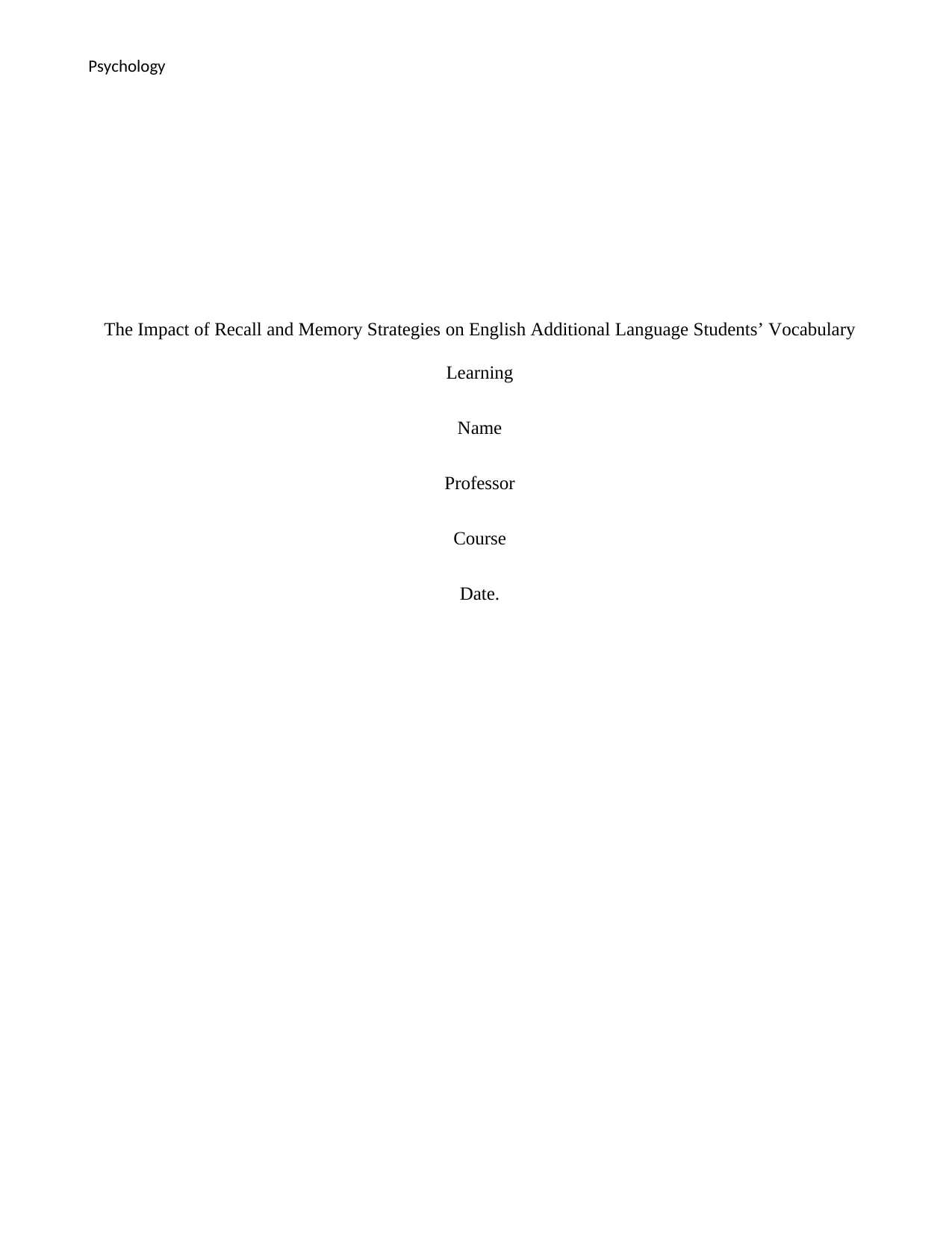
Psychology
The Impact of Recall and Memory Strategies on English Additional Language Students’ Vocabulary
Learning
Name
Professor
Course
Date.
The Impact of Recall and Memory Strategies on English Additional Language Students’ Vocabulary
Learning
Name
Professor
Course
Date.
Paraphrase This Document
Need a fresh take? Get an instant paraphrase of this document with our AI Paraphraser
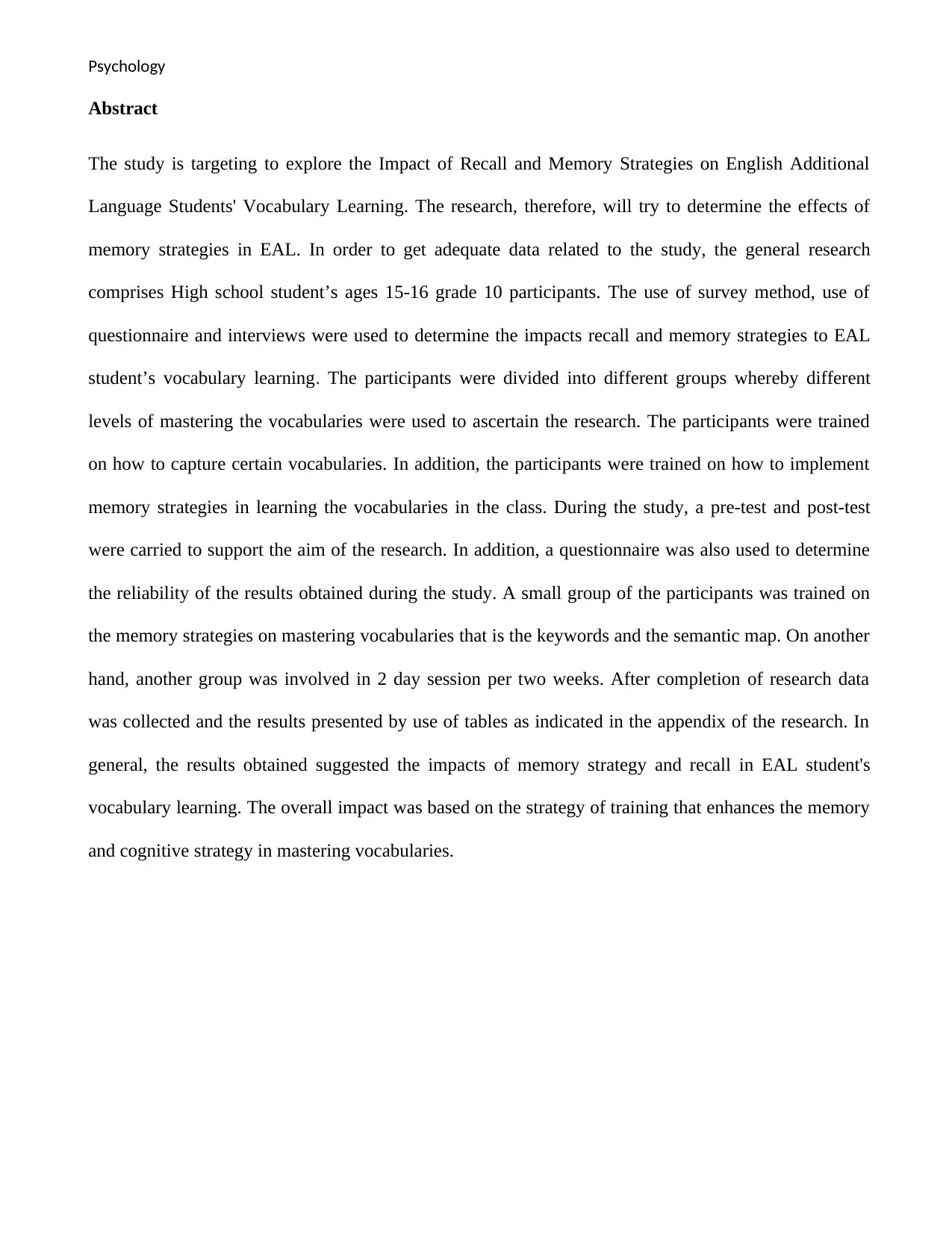
Psychology
Abstract
The study is targeting to explore the Impact of Recall and Memory Strategies on English Additional
Language Students' Vocabulary Learning. The research, therefore, will try to determine the effects of
memory strategies in EAL. In order to get adequate data related to the study, the general research
comprises High school student’s ages 15-16 grade 10 participants. The use of survey method, use of
questionnaire and interviews were used to determine the impacts recall and memory strategies to EAL
student’s vocabulary learning. The participants were divided into different groups whereby different
levels of mastering the vocabularies were used to ascertain the research. The participants were trained
on how to capture certain vocabularies. In addition, the participants were trained on how to implement
memory strategies in learning the vocabularies in the class. During the study, a pre-test and post-test
were carried to support the aim of the research. In addition, a questionnaire was also used to determine
the reliability of the results obtained during the study. A small group of the participants was trained on
the memory strategies on mastering vocabularies that is the keywords and the semantic map. On another
hand, another group was involved in 2 day session per two weeks. After completion of research data
was collected and the results presented by use of tables as indicated in the appendix of the research. In
general, the results obtained suggested the impacts of memory strategy and recall in EAL student's
vocabulary learning. The overall impact was based on the strategy of training that enhances the memory
and cognitive strategy in mastering vocabularies.
Abstract
The study is targeting to explore the Impact of Recall and Memory Strategies on English Additional
Language Students' Vocabulary Learning. The research, therefore, will try to determine the effects of
memory strategies in EAL. In order to get adequate data related to the study, the general research
comprises High school student’s ages 15-16 grade 10 participants. The use of survey method, use of
questionnaire and interviews were used to determine the impacts recall and memory strategies to EAL
student’s vocabulary learning. The participants were divided into different groups whereby different
levels of mastering the vocabularies were used to ascertain the research. The participants were trained
on how to capture certain vocabularies. In addition, the participants were trained on how to implement
memory strategies in learning the vocabularies in the class. During the study, a pre-test and post-test
were carried to support the aim of the research. In addition, a questionnaire was also used to determine
the reliability of the results obtained during the study. A small group of the participants was trained on
the memory strategies on mastering vocabularies that is the keywords and the semantic map. On another
hand, another group was involved in 2 day session per two weeks. After completion of research data
was collected and the results presented by use of tables as indicated in the appendix of the research. In
general, the results obtained suggested the impacts of memory strategy and recall in EAL student's
vocabulary learning. The overall impact was based on the strategy of training that enhances the memory
and cognitive strategy in mastering vocabularies.
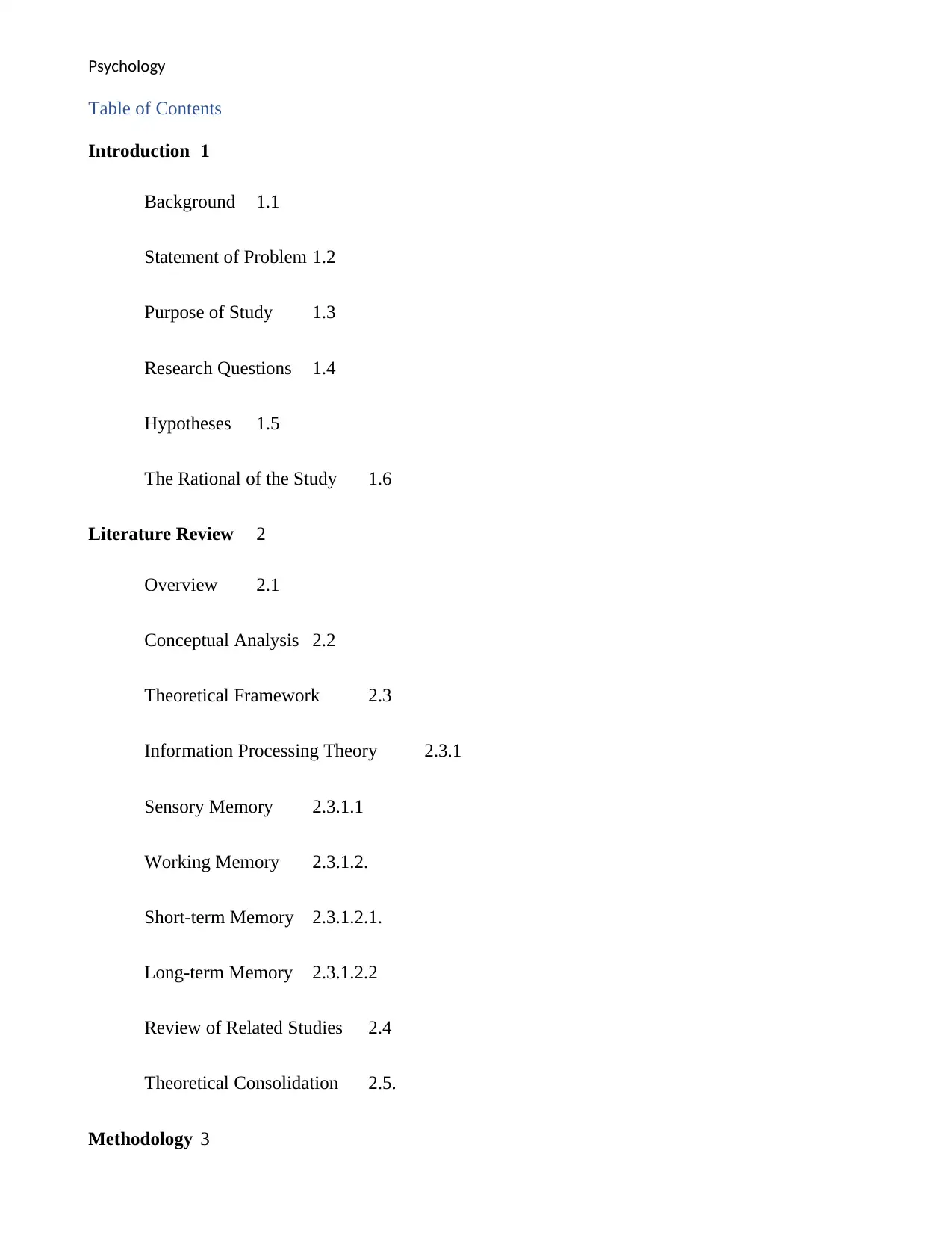
Psychology
Table of Contents
Introduction 1
Background 1.1
Statement of Problem 1.2
Purpose of Study 1.3
Research Questions 1.4
Hypotheses 1.5
The Rational of the Study 1.6
Literature Review 2
Overview 2.1
Conceptual Analysis 2.2
Theoretical Framework 2.3
Information Processing Theory 2.3.1
Sensory Memory 2.3.1.1
Working Memory 2.3.1.2.
Short-term Memory 2.3.1.2.1.
Long-term Memory 2.3.1.2.2
Review of Related Studies 2.4
Theoretical Consolidation 2.5.
Methodology 3
Table of Contents
Introduction 1
Background 1.1
Statement of Problem 1.2
Purpose of Study 1.3
Research Questions 1.4
Hypotheses 1.5
The Rational of the Study 1.6
Literature Review 2
Overview 2.1
Conceptual Analysis 2.2
Theoretical Framework 2.3
Information Processing Theory 2.3.1
Sensory Memory 2.3.1.1
Working Memory 2.3.1.2.
Short-term Memory 2.3.1.2.1.
Long-term Memory 2.3.1.2.2
Review of Related Studies 2.4
Theoretical Consolidation 2.5.
Methodology 3
⊘ This is a preview!⊘
Do you want full access?
Subscribe today to unlock all pages.

Trusted by 1+ million students worldwide
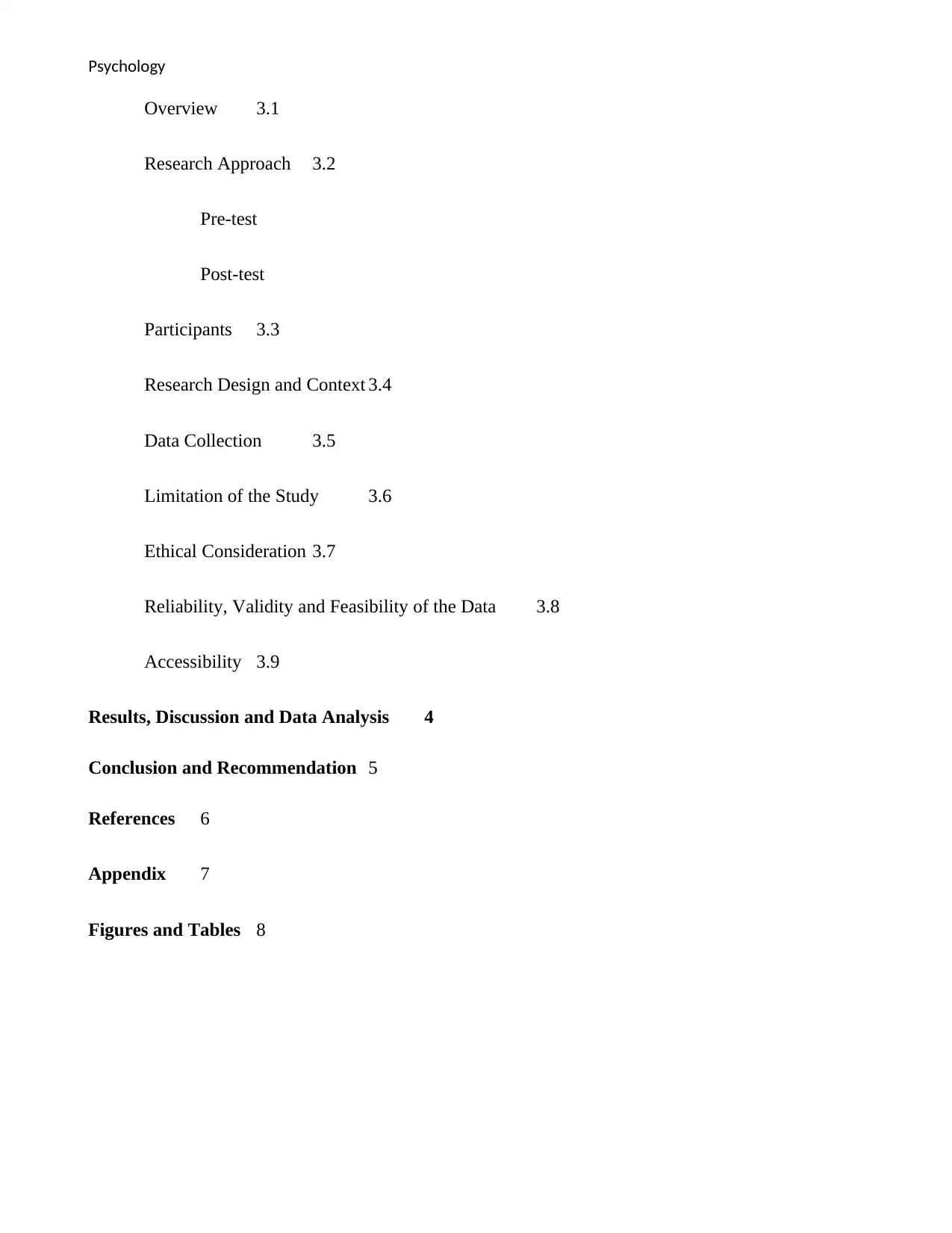
Psychology
Overview 3.1
Research Approach 3.2
Pre-test
Post-test
Participants 3.3
Research Design and Context 3.4
Data Collection 3.5
Limitation of the Study 3.6
Ethical Consideration 3.7
Reliability, Validity and Feasibility of the Data 3.8
Accessibility 3.9
Results, Discussion and Data Analysis 4
Conclusion and Recommendation 5
References 6
Appendix 7
Figures and Tables 8
Overview 3.1
Research Approach 3.2
Pre-test
Post-test
Participants 3.3
Research Design and Context 3.4
Data Collection 3.5
Limitation of the Study 3.6
Ethical Consideration 3.7
Reliability, Validity and Feasibility of the Data 3.8
Accessibility 3.9
Results, Discussion and Data Analysis 4
Conclusion and Recommendation 5
References 6
Appendix 7
Figures and Tables 8
Paraphrase This Document
Need a fresh take? Get an instant paraphrase of this document with our AI Paraphraser
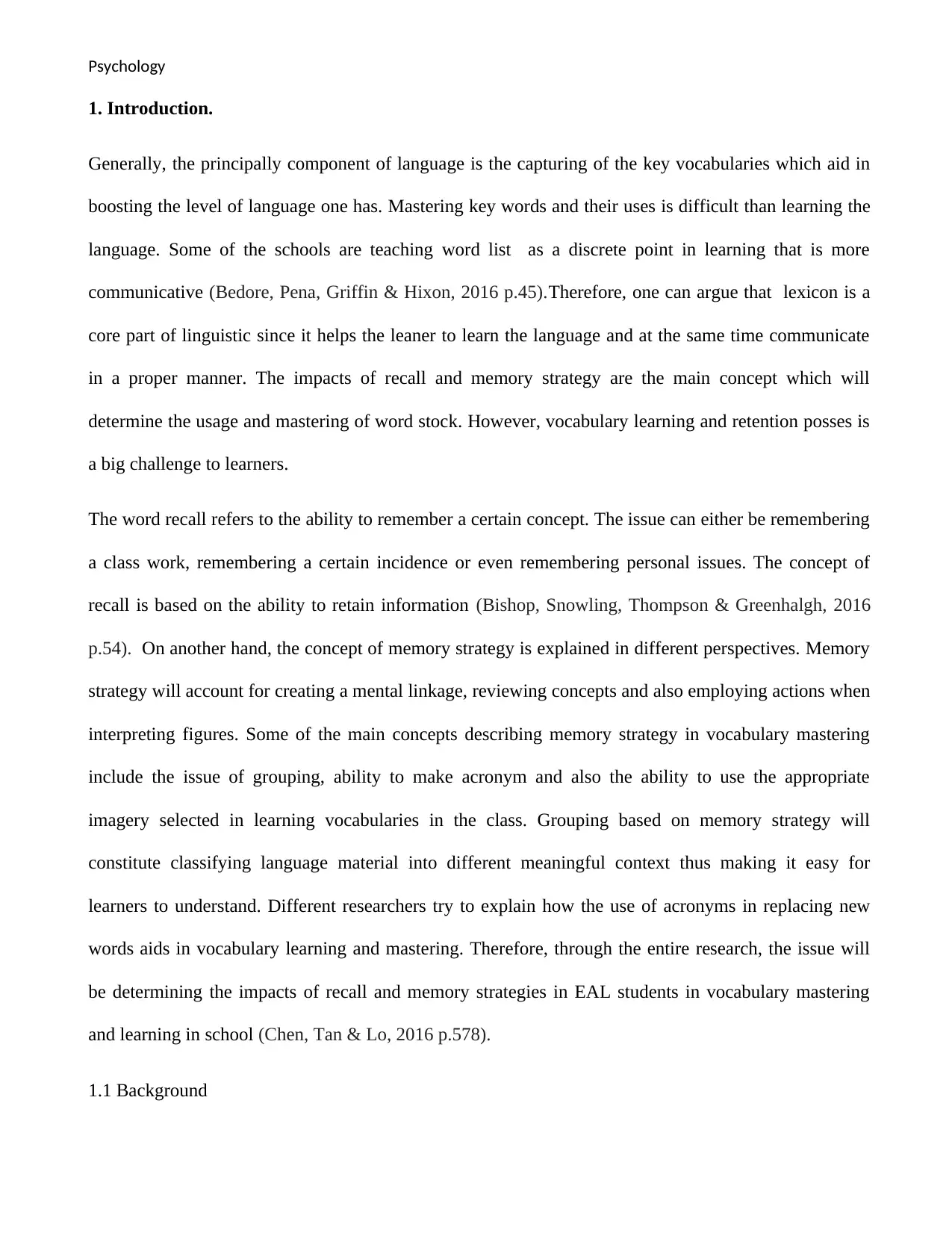
Psychology
1. Introduction.
Generally, the principally component of language is the capturing of the key vocabularies which aid in
boosting the level of language one has. Mastering key words and their uses is difficult than learning the
language. Some of the schools are teaching word list as a discrete point in learning that is more
communicative (Bedore, Pena, Griffin & Hixon, 2016 p.45).Therefore, one can argue that lexicon is a
core part of linguistic since it helps the leaner to learn the language and at the same time communicate
in a proper manner. The impacts of recall and memory strategy are the main concept which will
determine the usage and mastering of word stock. However, vocabulary learning and retention posses is
a big challenge to learners.
The word recall refers to the ability to remember a certain concept. The issue can either be remembering
a class work, remembering a certain incidence or even remembering personal issues. The concept of
recall is based on the ability to retain information (Bishop, Snowling, Thompson & Greenhalgh, 2016
p.54). On another hand, the concept of memory strategy is explained in different perspectives. Memory
strategy will account for creating a mental linkage, reviewing concepts and also employing actions when
interpreting figures. Some of the main concepts describing memory strategy in vocabulary mastering
include the issue of grouping, ability to make acronym and also the ability to use the appropriate
imagery selected in learning vocabularies in the class. Grouping based on memory strategy will
constitute classifying language material into different meaningful context thus making it easy for
learners to understand. Different researchers try to explain how the use of acronyms in replacing new
words aids in vocabulary learning and mastering. Therefore, through the entire research, the issue will
be determining the impacts of recall and memory strategies in EAL students in vocabulary mastering
and learning in school (Chen, Tan & Lo, 2016 p.578).
1.1 Background
1. Introduction.
Generally, the principally component of language is the capturing of the key vocabularies which aid in
boosting the level of language one has. Mastering key words and their uses is difficult than learning the
language. Some of the schools are teaching word list as a discrete point in learning that is more
communicative (Bedore, Pena, Griffin & Hixon, 2016 p.45).Therefore, one can argue that lexicon is a
core part of linguistic since it helps the leaner to learn the language and at the same time communicate
in a proper manner. The impacts of recall and memory strategy are the main concept which will
determine the usage and mastering of word stock. However, vocabulary learning and retention posses is
a big challenge to learners.
The word recall refers to the ability to remember a certain concept. The issue can either be remembering
a class work, remembering a certain incidence or even remembering personal issues. The concept of
recall is based on the ability to retain information (Bishop, Snowling, Thompson & Greenhalgh, 2016
p.54). On another hand, the concept of memory strategy is explained in different perspectives. Memory
strategy will account for creating a mental linkage, reviewing concepts and also employing actions when
interpreting figures. Some of the main concepts describing memory strategy in vocabulary mastering
include the issue of grouping, ability to make acronym and also the ability to use the appropriate
imagery selected in learning vocabularies in the class. Grouping based on memory strategy will
constitute classifying language material into different meaningful context thus making it easy for
learners to understand. Different researchers try to explain how the use of acronyms in replacing new
words aids in vocabulary learning and mastering. Therefore, through the entire research, the issue will
be determining the impacts of recall and memory strategies in EAL students in vocabulary mastering
and learning in school (Chen, Tan & Lo, 2016 p.578).
1.1 Background
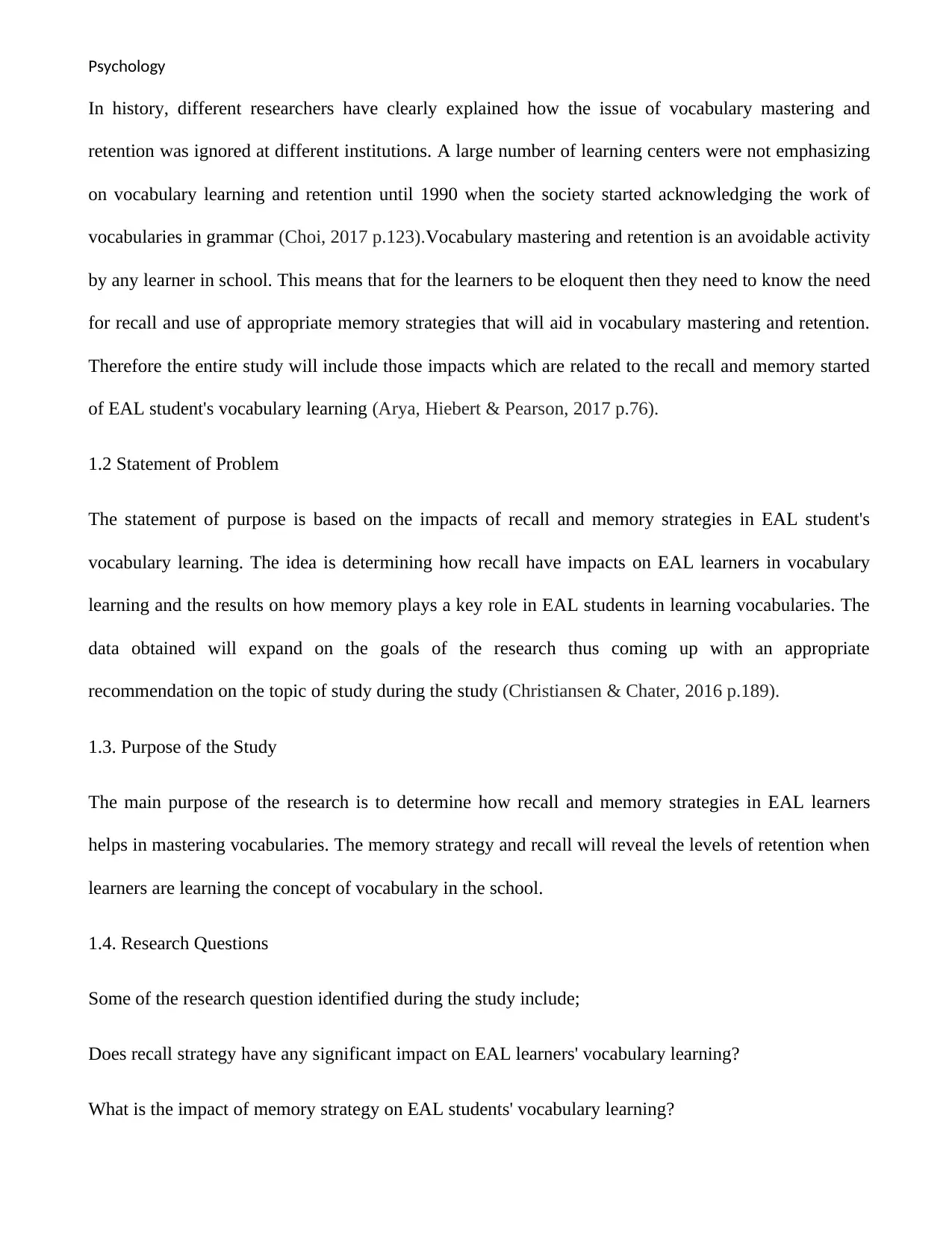
Psychology
In history, different researchers have clearly explained how the issue of vocabulary mastering and
retention was ignored at different institutions. A large number of learning centers were not emphasizing
on vocabulary learning and retention until 1990 when the society started acknowledging the work of
vocabularies in grammar (Choi, 2017 p.123).Vocabulary mastering and retention is an avoidable activity
by any learner in school. This means that for the learners to be eloquent then they need to know the need
for recall and use of appropriate memory strategies that will aid in vocabulary mastering and retention.
Therefore the entire study will include those impacts which are related to the recall and memory started
of EAL student's vocabulary learning (Arya, Hiebert & Pearson, 2017 p.76).
1.2 Statement of Problem
The statement of purpose is based on the impacts of recall and memory strategies in EAL student's
vocabulary learning. The idea is determining how recall have impacts on EAL learners in vocabulary
learning and the results on how memory plays a key role in EAL students in learning vocabularies. The
data obtained will expand on the goals of the research thus coming up with an appropriate
recommendation on the topic of study during the study (Christiansen & Chater, 2016 p.189).
1.3. Purpose of the Study
The main purpose of the research is to determine how recall and memory strategies in EAL learners
helps in mastering vocabularies. The memory strategy and recall will reveal the levels of retention when
learners are learning the concept of vocabulary in the school.
1.4. Research Questions
Some of the research question identified during the study include;
Does recall strategy have any significant impact on EAL learners' vocabulary learning?
What is the impact of memory strategy on EAL students' vocabulary learning?
In history, different researchers have clearly explained how the issue of vocabulary mastering and
retention was ignored at different institutions. A large number of learning centers were not emphasizing
on vocabulary learning and retention until 1990 when the society started acknowledging the work of
vocabularies in grammar (Choi, 2017 p.123).Vocabulary mastering and retention is an avoidable activity
by any learner in school. This means that for the learners to be eloquent then they need to know the need
for recall and use of appropriate memory strategies that will aid in vocabulary mastering and retention.
Therefore the entire study will include those impacts which are related to the recall and memory started
of EAL student's vocabulary learning (Arya, Hiebert & Pearson, 2017 p.76).
1.2 Statement of Problem
The statement of purpose is based on the impacts of recall and memory strategies in EAL student's
vocabulary learning. The idea is determining how recall have impacts on EAL learners in vocabulary
learning and the results on how memory plays a key role in EAL students in learning vocabularies. The
data obtained will expand on the goals of the research thus coming up with an appropriate
recommendation on the topic of study during the study (Christiansen & Chater, 2016 p.189).
1.3. Purpose of the Study
The main purpose of the research is to determine how recall and memory strategies in EAL learners
helps in mastering vocabularies. The memory strategy and recall will reveal the levels of retention when
learners are learning the concept of vocabulary in the school.
1.4. Research Questions
Some of the research question identified during the study include;
Does recall strategy have any significant impact on EAL learners' vocabulary learning?
What is the impact of memory strategy on EAL students' vocabulary learning?
⊘ This is a preview!⊘
Do you want full access?
Subscribe today to unlock all pages.

Trusted by 1+ million students worldwide
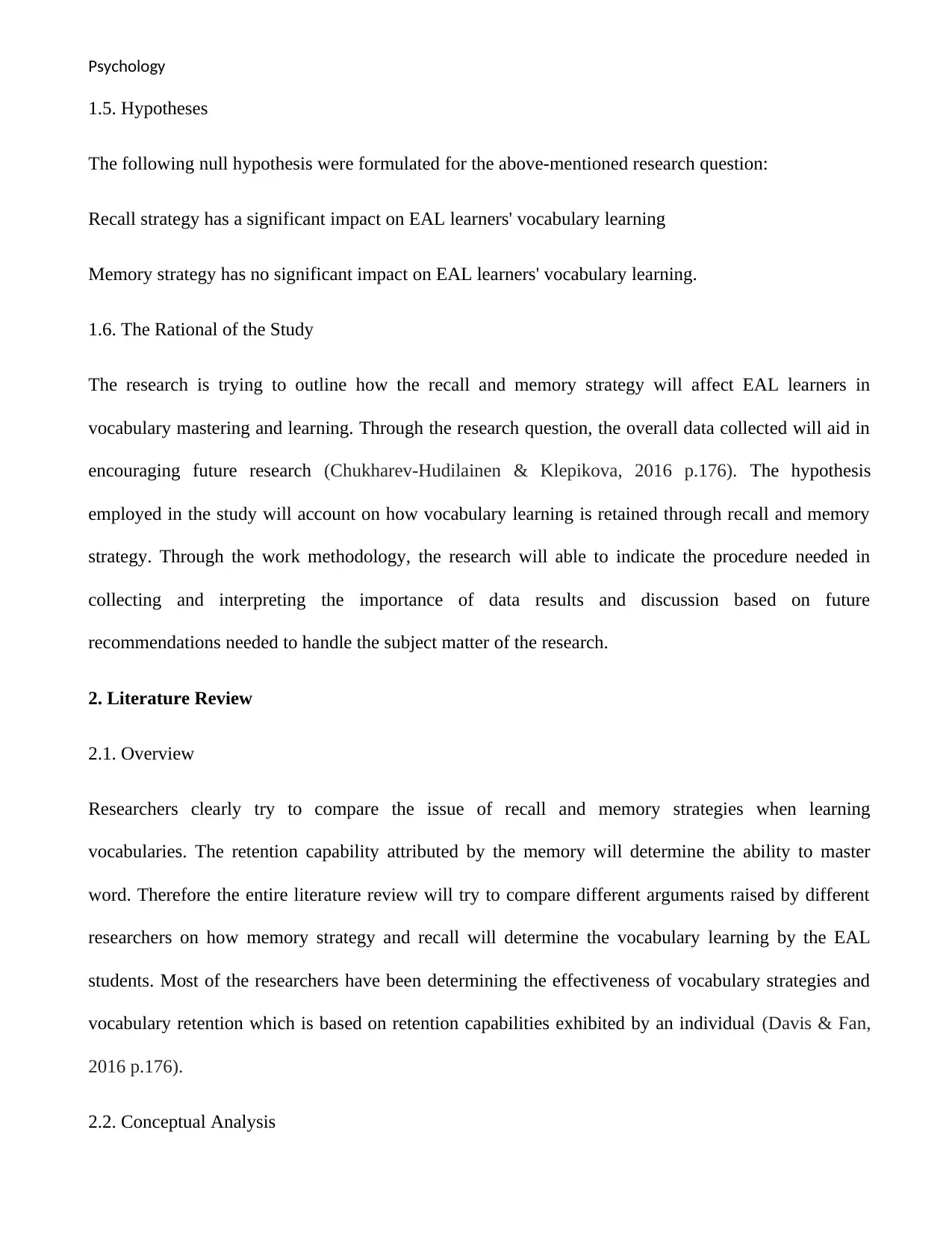
Psychology
1.5. Hypotheses
The following null hypothesis were formulated for the above-mentioned research question:
Recall strategy has a significant impact on EAL learners' vocabulary learning
Memory strategy has no significant impact on EAL learners' vocabulary learning.
1.6. The Rational of the Study
The research is trying to outline how the recall and memory strategy will affect EAL learners in
vocabulary mastering and learning. Through the research question, the overall data collected will aid in
encouraging future research (Chukharev-Hudilainen & Klepikova, 2016 p.176). The hypothesis
employed in the study will account on how vocabulary learning is retained through recall and memory
strategy. Through the work methodology, the research will able to indicate the procedure needed in
collecting and interpreting the importance of data results and discussion based on future
recommendations needed to handle the subject matter of the research.
2. Literature Review
2.1. Overview
Researchers clearly try to compare the issue of recall and memory strategies when learning
vocabularies. The retention capability attributed by the memory will determine the ability to master
word. Therefore the entire literature review will try to compare different arguments raised by different
researchers on how memory strategy and recall will determine the vocabulary learning by the EAL
students. Most of the researchers have been determining the effectiveness of vocabulary strategies and
vocabulary retention which is based on retention capabilities exhibited by an individual (Davis & Fan,
2016 p.176).
2.2. Conceptual Analysis
1.5. Hypotheses
The following null hypothesis were formulated for the above-mentioned research question:
Recall strategy has a significant impact on EAL learners' vocabulary learning
Memory strategy has no significant impact on EAL learners' vocabulary learning.
1.6. The Rational of the Study
The research is trying to outline how the recall and memory strategy will affect EAL learners in
vocabulary mastering and learning. Through the research question, the overall data collected will aid in
encouraging future research (Chukharev-Hudilainen & Klepikova, 2016 p.176). The hypothesis
employed in the study will account on how vocabulary learning is retained through recall and memory
strategy. Through the work methodology, the research will able to indicate the procedure needed in
collecting and interpreting the importance of data results and discussion based on future
recommendations needed to handle the subject matter of the research.
2. Literature Review
2.1. Overview
Researchers clearly try to compare the issue of recall and memory strategies when learning
vocabularies. The retention capability attributed by the memory will determine the ability to master
word. Therefore the entire literature review will try to compare different arguments raised by different
researchers on how memory strategy and recall will determine the vocabulary learning by the EAL
students. Most of the researchers have been determining the effectiveness of vocabulary strategies and
vocabulary retention which is based on retention capabilities exhibited by an individual (Davis & Fan,
2016 p.176).
2.2. Conceptual Analysis
Paraphrase This Document
Need a fresh take? Get an instant paraphrase of this document with our AI Paraphraser
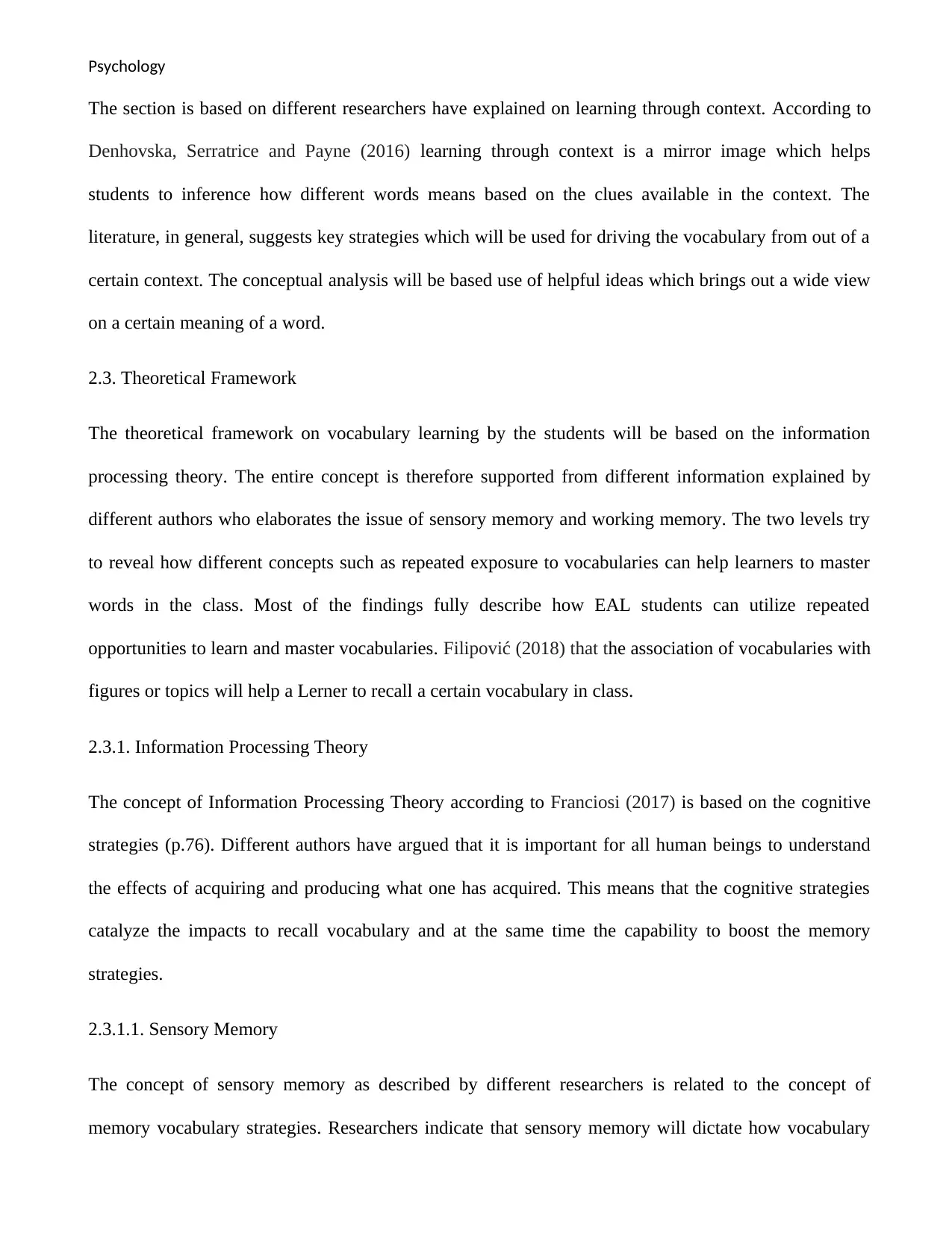
Psychology
The section is based on different researchers have explained on learning through context. According to
Denhovska, Serratrice and Payne (2016) learning through context is a mirror image which helps
students to inference how different words means based on the clues available in the context. The
literature, in general, suggests key strategies which will be used for driving the vocabulary from out of a
certain context. The conceptual analysis will be based use of helpful ideas which brings out a wide view
on a certain meaning of a word.
2.3. Theoretical Framework
The theoretical framework on vocabulary learning by the students will be based on the information
processing theory. The entire concept is therefore supported from different information explained by
different authors who elaborates the issue of sensory memory and working memory. The two levels try
to reveal how different concepts such as repeated exposure to vocabularies can help learners to master
words in the class. Most of the findings fully describe how EAL students can utilize repeated
opportunities to learn and master vocabularies. Filipović (2018) that the association of vocabularies with
figures or topics will help a Lerner to recall a certain vocabulary in class.
2.3.1. Information Processing Theory
The concept of Information Processing Theory according to Franciosi (2017) is based on the cognitive
strategies (p.76). Different authors have argued that it is important for all human beings to understand
the effects of acquiring and producing what one has acquired. This means that the cognitive strategies
catalyze the impacts to recall vocabulary and at the same time the capability to boost the memory
strategies.
2.3.1.1. Sensory Memory
The concept of sensory memory as described by different researchers is related to the concept of
memory vocabulary strategies. Researchers indicate that sensory memory will dictate how vocabulary
The section is based on different researchers have explained on learning through context. According to
Denhovska, Serratrice and Payne (2016) learning through context is a mirror image which helps
students to inference how different words means based on the clues available in the context. The
literature, in general, suggests key strategies which will be used for driving the vocabulary from out of a
certain context. The conceptual analysis will be based use of helpful ideas which brings out a wide view
on a certain meaning of a word.
2.3. Theoretical Framework
The theoretical framework on vocabulary learning by the students will be based on the information
processing theory. The entire concept is therefore supported from different information explained by
different authors who elaborates the issue of sensory memory and working memory. The two levels try
to reveal how different concepts such as repeated exposure to vocabularies can help learners to master
words in the class. Most of the findings fully describe how EAL students can utilize repeated
opportunities to learn and master vocabularies. Filipović (2018) that the association of vocabularies with
figures or topics will help a Lerner to recall a certain vocabulary in class.
2.3.1. Information Processing Theory
The concept of Information Processing Theory according to Franciosi (2017) is based on the cognitive
strategies (p.76). Different authors have argued that it is important for all human beings to understand
the effects of acquiring and producing what one has acquired. This means that the cognitive strategies
catalyze the impacts to recall vocabulary and at the same time the capability to boost the memory
strategies.
2.3.1.1. Sensory Memory
The concept of sensory memory as described by different researchers is related to the concept of
memory vocabulary strategies. Researchers indicate that sensory memory will dictate how vocabulary
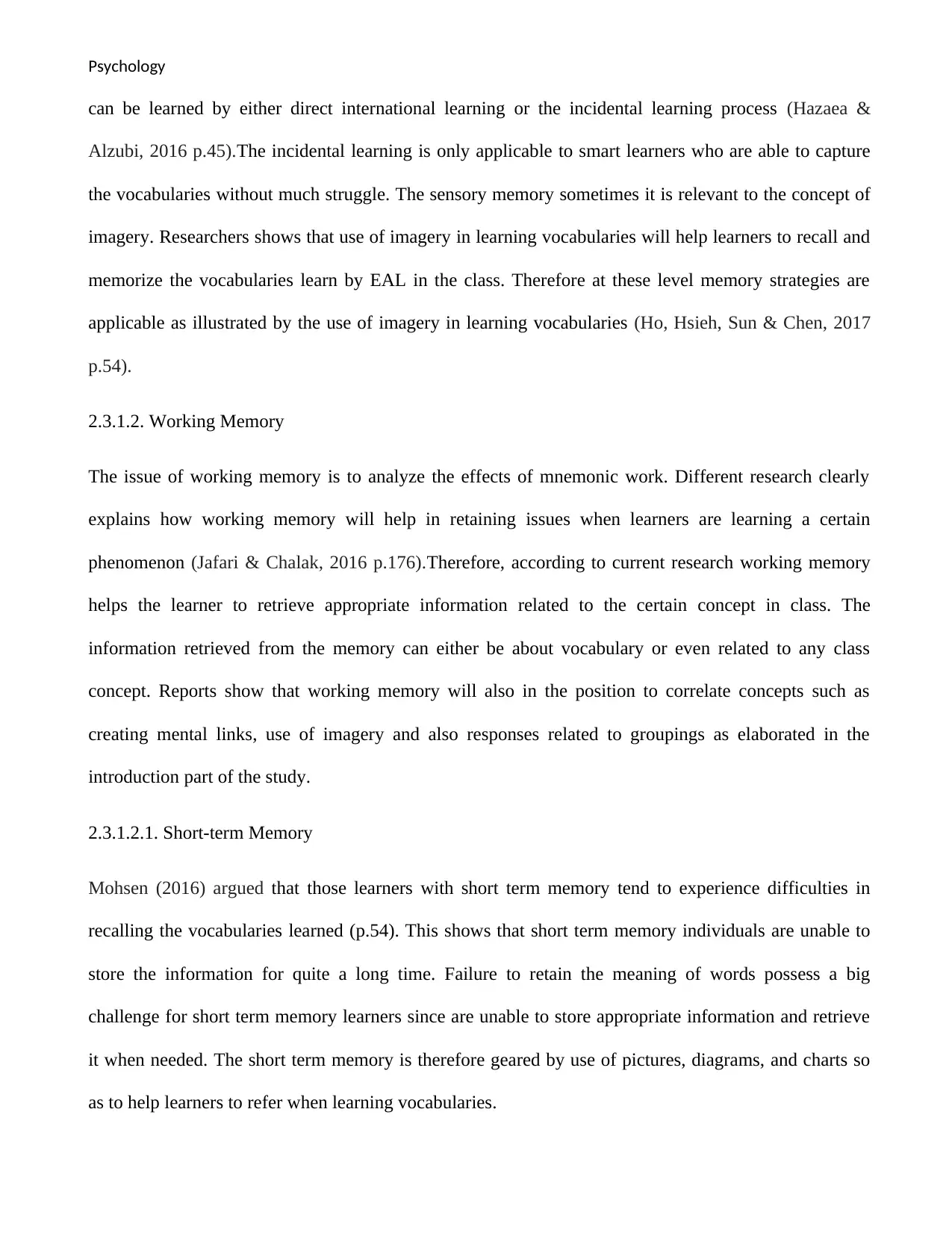
Psychology
can be learned by either direct international learning or the incidental learning process (Hazaea &
Alzubi, 2016 p.45).The incidental learning is only applicable to smart learners who are able to capture
the vocabularies without much struggle. The sensory memory sometimes it is relevant to the concept of
imagery. Researchers shows that use of imagery in learning vocabularies will help learners to recall and
memorize the vocabularies learn by EAL in the class. Therefore at these level memory strategies are
applicable as illustrated by the use of imagery in learning vocabularies (Ho, Hsieh, Sun & Chen, 2017
p.54).
2.3.1.2. Working Memory
The issue of working memory is to analyze the effects of mnemonic work. Different research clearly
explains how working memory will help in retaining issues when learners are learning a certain
phenomenon (Jafari & Chalak, 2016 p.176).Therefore, according to current research working memory
helps the learner to retrieve appropriate information related to the certain concept in class. The
information retrieved from the memory can either be about vocabulary or even related to any class
concept. Reports show that working memory will also in the position to correlate concepts such as
creating mental links, use of imagery and also responses related to groupings as elaborated in the
introduction part of the study.
2.3.1.2.1. Short-term Memory
Mohsen (2016) argued that those learners with short term memory tend to experience difficulties in
recalling the vocabularies learned (p.54). This shows that short term memory individuals are unable to
store the information for quite a long time. Failure to retain the meaning of words possess a big
challenge for short term memory learners since are unable to store appropriate information and retrieve
it when needed. The short term memory is therefore geared by use of pictures, diagrams, and charts so
as to help learners to refer when learning vocabularies.
can be learned by either direct international learning or the incidental learning process (Hazaea &
Alzubi, 2016 p.45).The incidental learning is only applicable to smart learners who are able to capture
the vocabularies without much struggle. The sensory memory sometimes it is relevant to the concept of
imagery. Researchers shows that use of imagery in learning vocabularies will help learners to recall and
memorize the vocabularies learn by EAL in the class. Therefore at these level memory strategies are
applicable as illustrated by the use of imagery in learning vocabularies (Ho, Hsieh, Sun & Chen, 2017
p.54).
2.3.1.2. Working Memory
The issue of working memory is to analyze the effects of mnemonic work. Different research clearly
explains how working memory will help in retaining issues when learners are learning a certain
phenomenon (Jafari & Chalak, 2016 p.176).Therefore, according to current research working memory
helps the learner to retrieve appropriate information related to the certain concept in class. The
information retrieved from the memory can either be about vocabulary or even related to any class
concept. Reports show that working memory will also in the position to correlate concepts such as
creating mental links, use of imagery and also responses related to groupings as elaborated in the
introduction part of the study.
2.3.1.2.1. Short-term Memory
Mohsen (2016) argued that those learners with short term memory tend to experience difficulties in
recalling the vocabularies learned (p.54). This shows that short term memory individuals are unable to
store the information for quite a long time. Failure to retain the meaning of words possess a big
challenge for short term memory learners since are unable to store appropriate information and retrieve
it when needed. The short term memory is therefore geared by use of pictures, diagrams, and charts so
as to help learners to refer when learning vocabularies.
⊘ This is a preview!⊘
Do you want full access?
Subscribe today to unlock all pages.

Trusted by 1+ million students worldwide
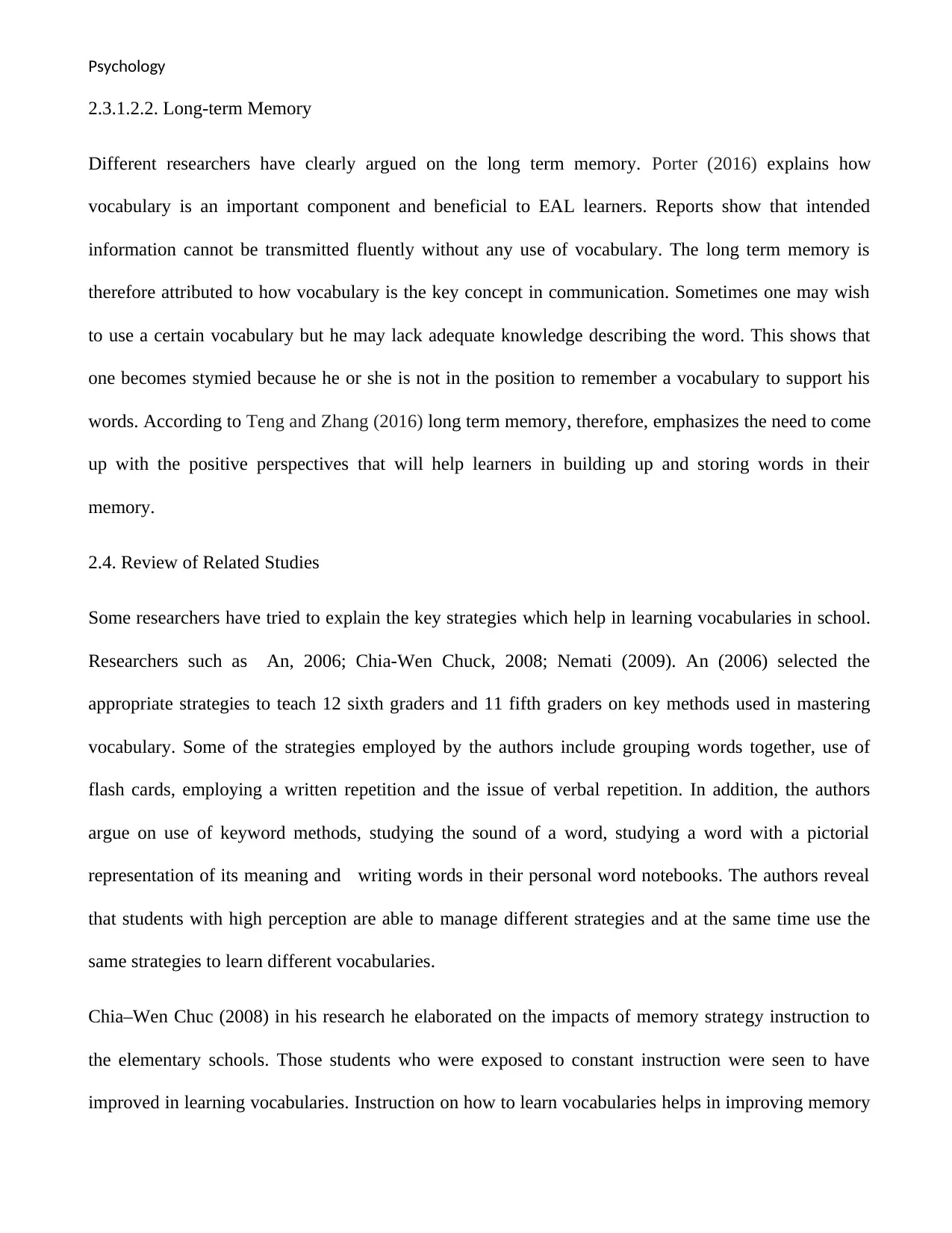
Psychology
2.3.1.2.2. Long-term Memory
Different researchers have clearly argued on the long term memory. Porter (2016) explains how
vocabulary is an important component and beneficial to EAL learners. Reports show that intended
information cannot be transmitted fluently without any use of vocabulary. The long term memory is
therefore attributed to how vocabulary is the key concept in communication. Sometimes one may wish
to use a certain vocabulary but he may lack adequate knowledge describing the word. This shows that
one becomes stymied because he or she is not in the position to remember a vocabulary to support his
words. According to Teng and Zhang (2016) long term memory, therefore, emphasizes the need to come
up with the positive perspectives that will help learners in building up and storing words in their
memory.
2.4. Review of Related Studies
Some researchers have tried to explain the key strategies which help in learning vocabularies in school.
Researchers such as An, 2006; Chia-Wen Chuck, 2008; Nemati (2009). An (2006) selected the
appropriate strategies to teach 12 sixth graders and 11 fifth graders on key methods used in mastering
vocabulary. Some of the strategies employed by the authors include grouping words together, use of
flash cards, employing a written repetition and the issue of verbal repetition. In addition, the authors
argue on use of keyword methods, studying the sound of a word, studying a word with a pictorial
representation of its meaning and writing words in their personal word notebooks. The authors reveal
that students with high perception are able to manage different strategies and at the same time use the
same strategies to learn different vocabularies.
Chia–Wen Chuc (2008) in his research he elaborated on the impacts of memory strategy instruction to
the elementary schools. Those students who were exposed to constant instruction were seen to have
improved in learning vocabularies. Instruction on how to learn vocabularies helps in improving memory
2.3.1.2.2. Long-term Memory
Different researchers have clearly argued on the long term memory. Porter (2016) explains how
vocabulary is an important component and beneficial to EAL learners. Reports show that intended
information cannot be transmitted fluently without any use of vocabulary. The long term memory is
therefore attributed to how vocabulary is the key concept in communication. Sometimes one may wish
to use a certain vocabulary but he may lack adequate knowledge describing the word. This shows that
one becomes stymied because he or she is not in the position to remember a vocabulary to support his
words. According to Teng and Zhang (2016) long term memory, therefore, emphasizes the need to come
up with the positive perspectives that will help learners in building up and storing words in their
memory.
2.4. Review of Related Studies
Some researchers have tried to explain the key strategies which help in learning vocabularies in school.
Researchers such as An, 2006; Chia-Wen Chuck, 2008; Nemati (2009). An (2006) selected the
appropriate strategies to teach 12 sixth graders and 11 fifth graders on key methods used in mastering
vocabulary. Some of the strategies employed by the authors include grouping words together, use of
flash cards, employing a written repetition and the issue of verbal repetition. In addition, the authors
argue on use of keyword methods, studying the sound of a word, studying a word with a pictorial
representation of its meaning and writing words in their personal word notebooks. The authors reveal
that students with high perception are able to manage different strategies and at the same time use the
same strategies to learn different vocabularies.
Chia–Wen Chuc (2008) in his research he elaborated on the impacts of memory strategy instruction to
the elementary schools. Those students who were exposed to constant instruction were seen to have
improved in learning vocabularies. Instruction on how to learn vocabularies helps in improving memory
Paraphrase This Document
Need a fresh take? Get an instant paraphrase of this document with our AI Paraphraser
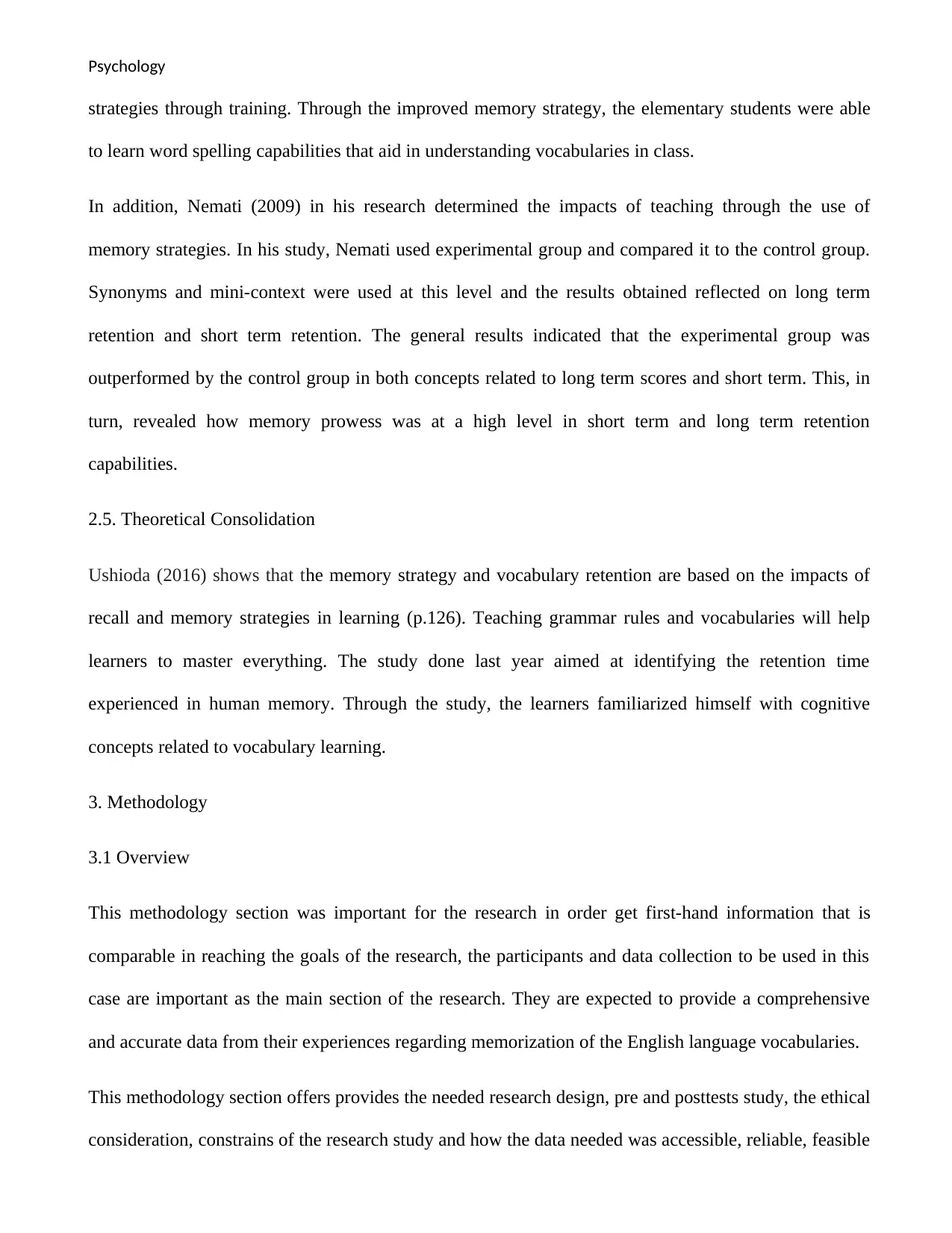
Psychology
strategies through training. Through the improved memory strategy, the elementary students were able
to learn word spelling capabilities that aid in understanding vocabularies in class.
In addition, Nemati (2009) in his research determined the impacts of teaching through the use of
memory strategies. In his study, Nemati used experimental group and compared it to the control group.
Synonyms and mini-context were used at this level and the results obtained reflected on long term
retention and short term retention. The general results indicated that the experimental group was
outperformed by the control group in both concepts related to long term scores and short term. This, in
turn, revealed how memory prowess was at a high level in short term and long term retention
capabilities.
2.5. Theoretical Consolidation
Ushioda (2016) shows that the memory strategy and vocabulary retention are based on the impacts of
recall and memory strategies in learning (p.126). Teaching grammar rules and vocabularies will help
learners to master everything. The study done last year aimed at identifying the retention time
experienced in human memory. Through the study, the learners familiarized himself with cognitive
concepts related to vocabulary learning.
3. Methodology
3.1 Overview
This methodology section was important for the research in order get first-hand information that is
comparable in reaching the goals of the research, the participants and data collection to be used in this
case are important as the main section of the research. They are expected to provide a comprehensive
and accurate data from their experiences regarding memorization of the English language vocabularies.
This methodology section offers provides the needed research design, pre and posttests study, the ethical
consideration, constrains of the research study and how the data needed was accessible, reliable, feasible
strategies through training. Through the improved memory strategy, the elementary students were able
to learn word spelling capabilities that aid in understanding vocabularies in class.
In addition, Nemati (2009) in his research determined the impacts of teaching through the use of
memory strategies. In his study, Nemati used experimental group and compared it to the control group.
Synonyms and mini-context were used at this level and the results obtained reflected on long term
retention and short term retention. The general results indicated that the experimental group was
outperformed by the control group in both concepts related to long term scores and short term. This, in
turn, revealed how memory prowess was at a high level in short term and long term retention
capabilities.
2.5. Theoretical Consolidation
Ushioda (2016) shows that the memory strategy and vocabulary retention are based on the impacts of
recall and memory strategies in learning (p.126). Teaching grammar rules and vocabularies will help
learners to master everything. The study done last year aimed at identifying the retention time
experienced in human memory. Through the study, the learners familiarized himself with cognitive
concepts related to vocabulary learning.
3. Methodology
3.1 Overview
This methodology section was important for the research in order get first-hand information that is
comparable in reaching the goals of the research, the participants and data collection to be used in this
case are important as the main section of the research. They are expected to provide a comprehensive
and accurate data from their experiences regarding memorization of the English language vocabularies.
This methodology section offers provides the needed research design, pre and posttests study, the ethical
consideration, constrains of the research study and how the data needed was accessible, reliable, feasible
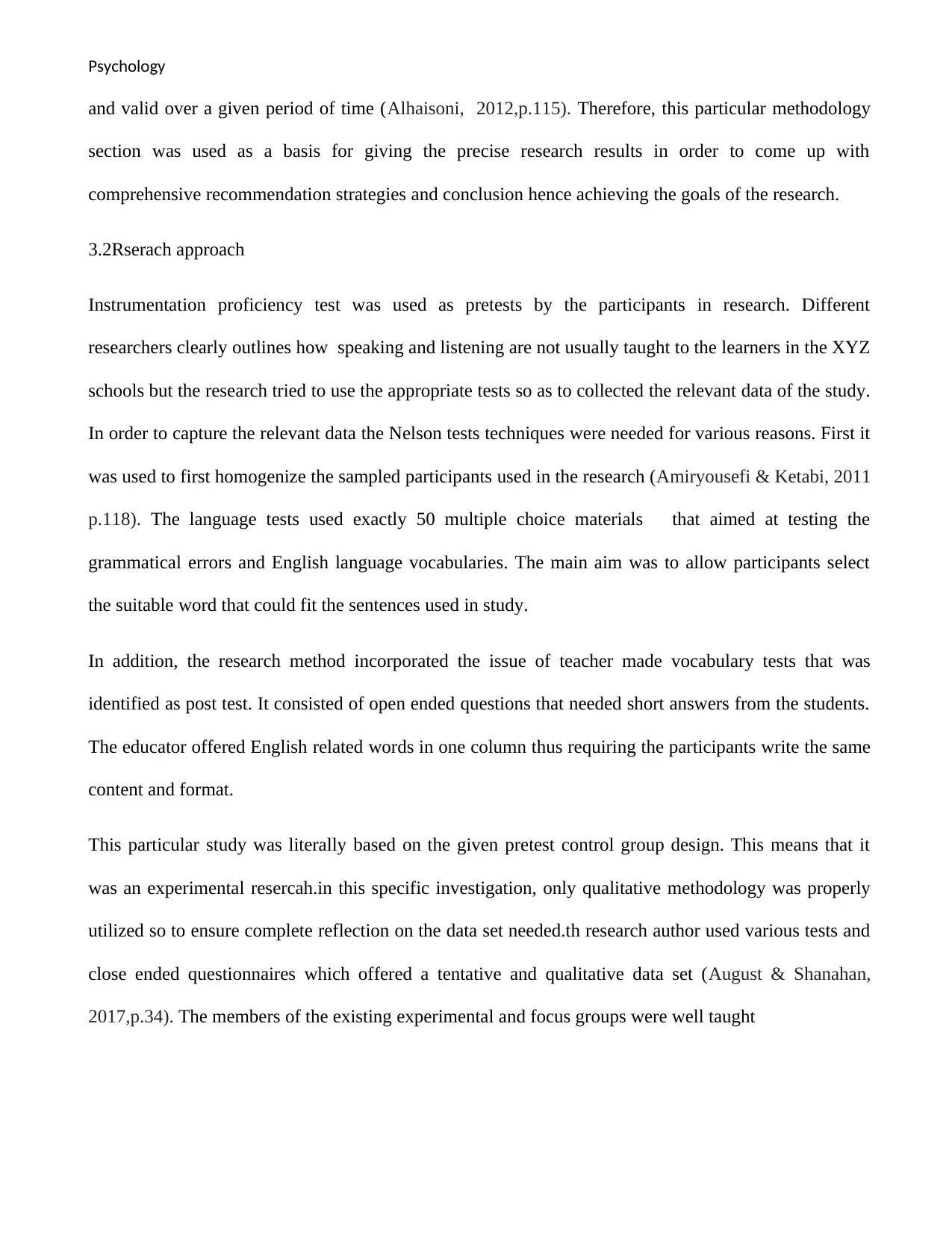
Psychology
and valid over a given period of time (Alhaisoni, 2012,p.115). Therefore, this particular methodology
section was used as a basis for giving the precise research results in order to come up with
comprehensive recommendation strategies and conclusion hence achieving the goals of the research.
3.2Rserach approach
Instrumentation proficiency test was used as pretests by the participants in research. Different
researchers clearly outlines how speaking and listening are not usually taught to the learners in the XYZ
schools but the research tried to use the appropriate tests so as to collected the relevant data of the study.
In order to capture the relevant data the Nelson tests techniques were needed for various reasons. First it
was used to first homogenize the sampled participants used in the research (Amiryousefi & Ketabi, 2011
p.118). The language tests used exactly 50 multiple choice materials that aimed at testing the
grammatical errors and English language vocabularies. The main aim was to allow participants select
the suitable word that could fit the sentences used in study.
In addition, the research method incorporated the issue of teacher made vocabulary tests that was
identified as post test. It consisted of open ended questions that needed short answers from the students.
The educator offered English related words in one column thus requiring the participants write the same
content and format.
This particular study was literally based on the given pretest control group design. This means that it
was an experimental resercah.in this specific investigation, only qualitative methodology was properly
utilized so to ensure complete reflection on the data set needed.th research author used various tests and
close ended questionnaires which offered a tentative and qualitative data set (August & Shanahan,
2017,p.34). The members of the existing experimental and focus groups were well taught
and valid over a given period of time (Alhaisoni, 2012,p.115). Therefore, this particular methodology
section was used as a basis for giving the precise research results in order to come up with
comprehensive recommendation strategies and conclusion hence achieving the goals of the research.
3.2Rserach approach
Instrumentation proficiency test was used as pretests by the participants in research. Different
researchers clearly outlines how speaking and listening are not usually taught to the learners in the XYZ
schools but the research tried to use the appropriate tests so as to collected the relevant data of the study.
In order to capture the relevant data the Nelson tests techniques were needed for various reasons. First it
was used to first homogenize the sampled participants used in the research (Amiryousefi & Ketabi, 2011
p.118). The language tests used exactly 50 multiple choice materials that aimed at testing the
grammatical errors and English language vocabularies. The main aim was to allow participants select
the suitable word that could fit the sentences used in study.
In addition, the research method incorporated the issue of teacher made vocabulary tests that was
identified as post test. It consisted of open ended questions that needed short answers from the students.
The educator offered English related words in one column thus requiring the participants write the same
content and format.
This particular study was literally based on the given pretest control group design. This means that it
was an experimental resercah.in this specific investigation, only qualitative methodology was properly
utilized so to ensure complete reflection on the data set needed.th research author used various tests and
close ended questionnaires which offered a tentative and qualitative data set (August & Shanahan,
2017,p.34). The members of the existing experimental and focus groups were well taught
⊘ This is a preview!⊘
Do you want full access?
Subscribe today to unlock all pages.

Trusted by 1+ million students worldwide
1 out of 28
Related Documents
Your All-in-One AI-Powered Toolkit for Academic Success.
+13062052269
info@desklib.com
Available 24*7 on WhatsApp / Email
![[object Object]](/_next/static/media/star-bottom.7253800d.svg)
Unlock your academic potential
Copyright © 2020–2026 A2Z Services. All Rights Reserved. Developed and managed by ZUCOL.





